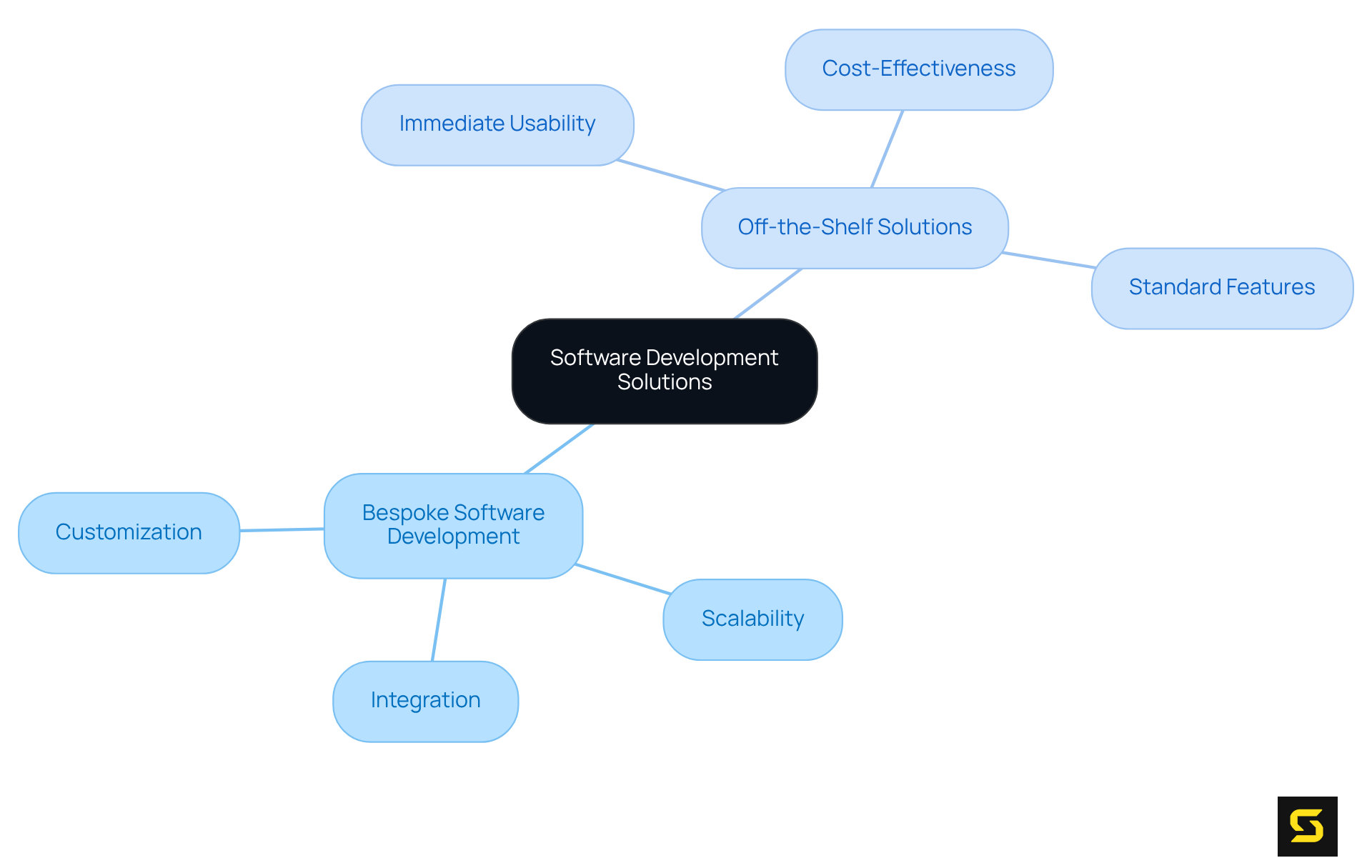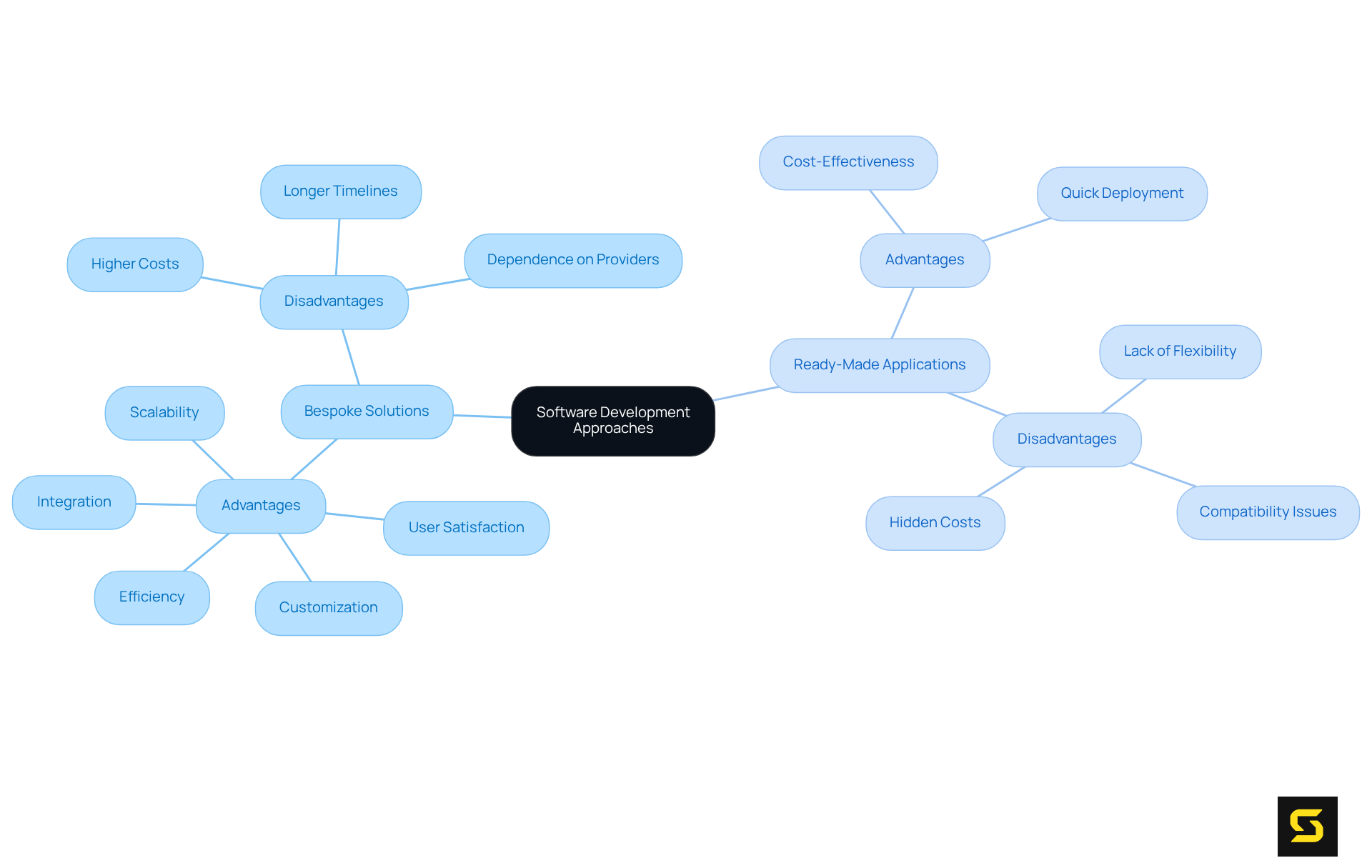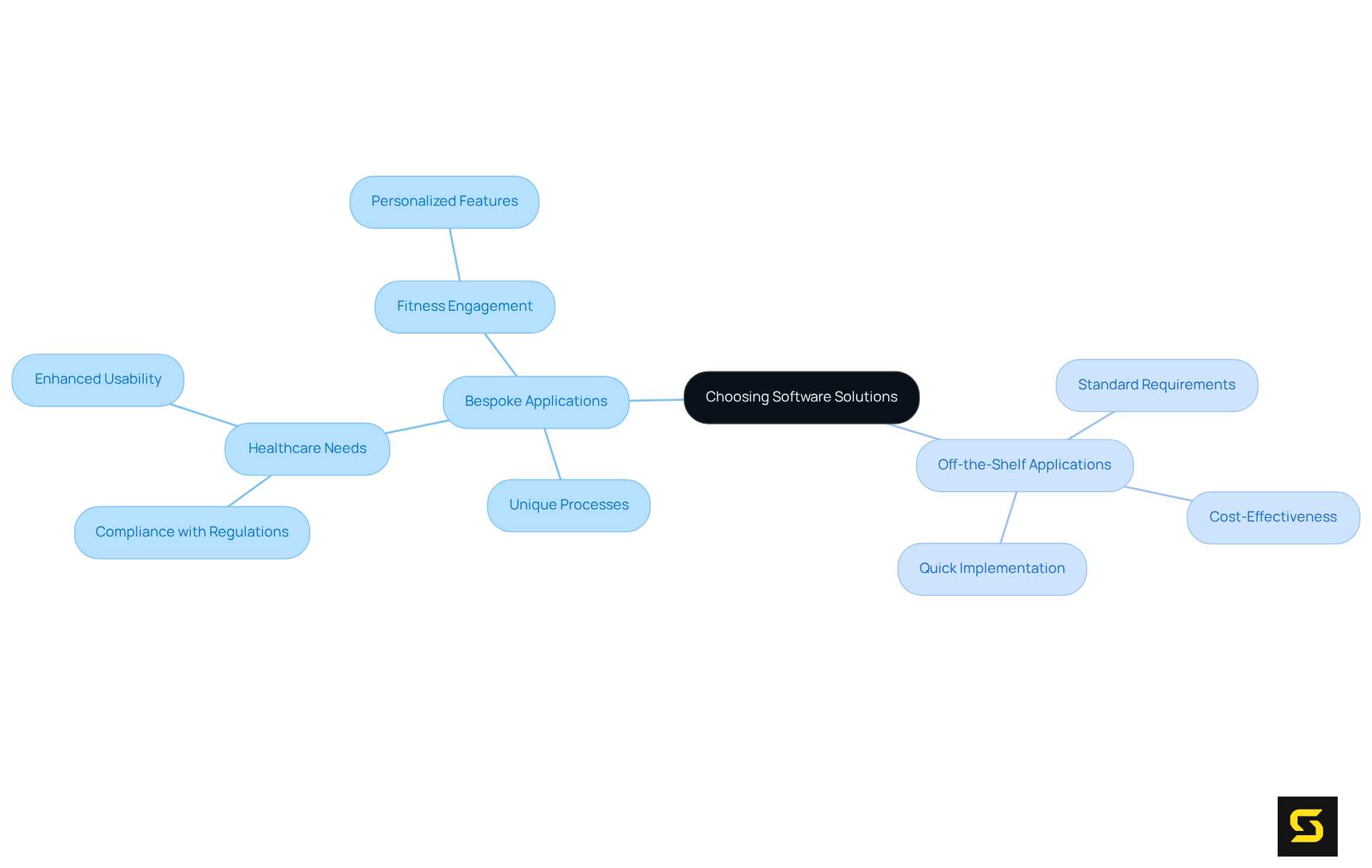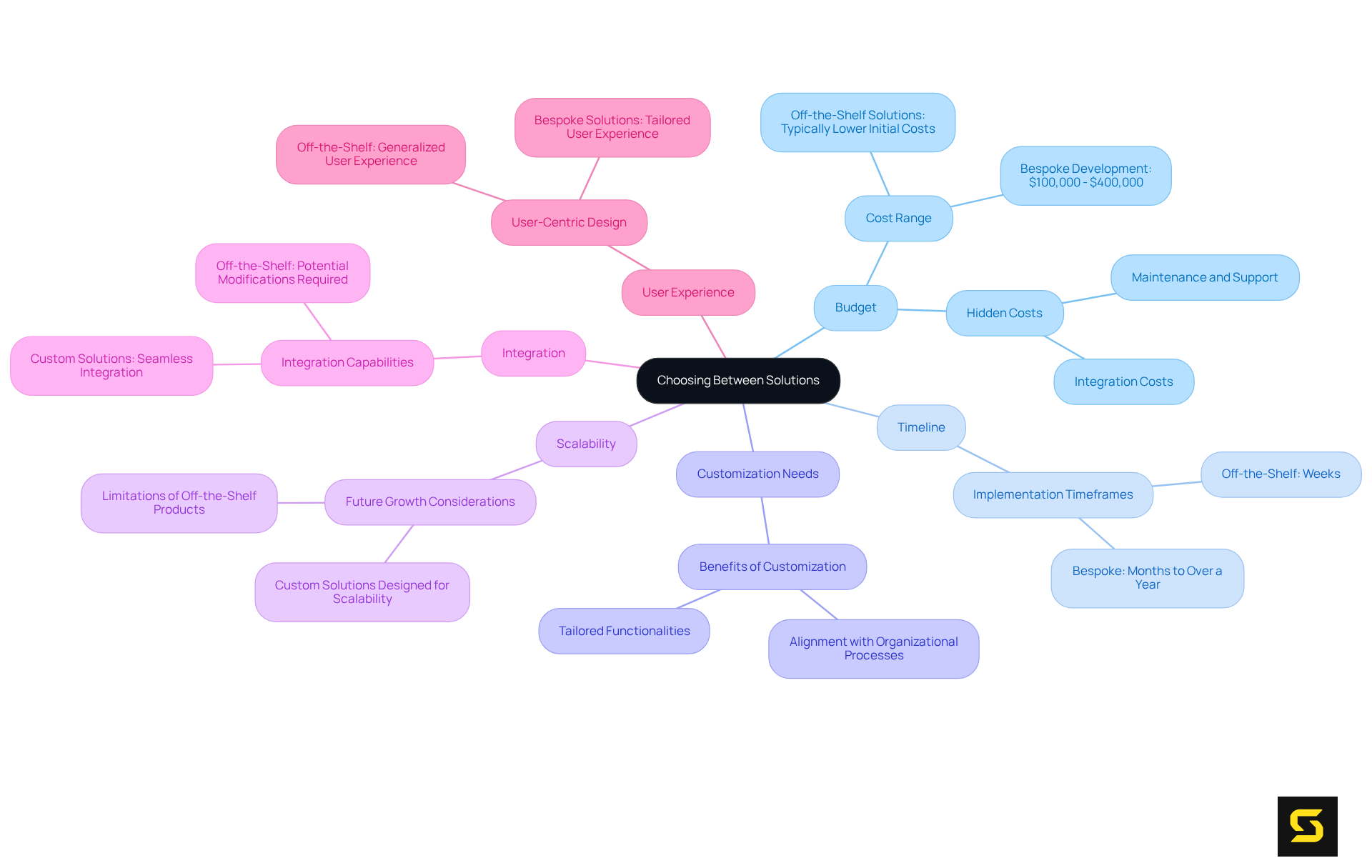Overview
This article presents a comprehensive comparison between bespoke software development companies and off-the-shelf solutions, emphasizing the distinct advantages and disadvantages inherent to each approach.
It asserts that bespoke software delivers unparalleled customization and scalability specifically tailored to meet unique business needs.
Conversely, off-the-shelf solutions offer immediate usability and reduced initial costs.
Ultimately, the selection process hinges on an organization's specific requirements and budgetary considerations.
Introduction
The landscape of software solutions is evolving. Businesses find themselves increasingly torn between the allure of bespoke software development and the convenience of off-the-shelf applications. As organizations strive for efficiency and tailored functionality, it is crucial to understand the distinct advantages and limitations of each option.
Companies must consider several factors when deciding between a custom-built solution that promises adaptability and a ready-made product that offers immediate implementation. This article delves into the key insights surrounding bespoke software development and off-the-shelf solutions, guiding readers through the complexities of making an informed choice that aligns with their unique operational needs.
Defining Bespoke Software Development and Off-the-Shelf Solutions
A bespoke software development company signifies the art of crafting custom-built solutions tailored to meet the distinct needs of a business or organization. Such applications are meticulously designed from the ground up, allowing for comprehensive customization in features, functionality, and user experience. In contrast, ready-made products are pre-packaged applications intended for a broader audience. While these options are readily available and can be implemented swiftly, they often fall short in adaptability to address specific organizational requirements. Although custom applications provide a precise fit, ready-made solutions offer convenience and immediate usability.
The growing inclination towards customized applications is evident, with a significant number of companies recognizing the limitations of off-the-shelf options provided by a bespoke software development company. By 2025, it is projected that over 83% of businesses will adopt tailored applications, a notable increase from the 62% reported in 2018. This shift underscores the rising demand for that enhance operational efficiency and customer engagement.
Key characteristics of bespoke software development encompass:
- Customization: Tailored features and functionalities that align with specific business needs.
- Scalability: Designed to evolve with the business, accommodating future demands without extensive modifications.
- Integration: Seamless compatibility with existing systems and processes, optimizing overall workflow.
Conversely, off-the-shelf solutions typically provide:
- Immediate Usability: Ready-to-use software that can be deployed without delay.
- Cost-Effectiveness: Lower initial investment compared to custom solutions, appealing to budget-conscious organizations.
- Standard Features: Basic functionalities that may not fully address unique organizational challenges.
Industry leaders emphasize the benefits of tailored application development provided by a bespoke software development company. For instance, companies investing in customized solutions have reported an average revenue increase of 20%, highlighting the long-term advantages of personalized applications. As the custom application development market is expected to grow at a compound annual growth rate of 22.6% from 2025 to 2030, reaching USD 146.18 billion by 2030, it is clear that organizations are prioritizing a bespoke software development company to secure competitive advantages.
Successful examples of custom application development abound, such as healthcare providers implementing tailored patient management systems to enhance care delivery and fitness companies creating unique platforms to elevate user engagement. These instances illustrate how bespoke approaches can effectively address specific organizational needs, driving innovation and operational success.

Comparing Advantages and Disadvantages of Each Approach
A bespoke software development company offers significant advantages through bespoke application development, including complete customization, scalability, and seamless integration with existing systems. This tailored approach, often provided by a bespoke software development company, enables organizations to devise strategies that align precisely with their operational processes, often resulting in enhanced efficiency and user satisfaction. As businesses grow, these customized applications can be adjusted and improved over time, adapting to evolving requirements without compromising performance. However, it is crucial to recognize that bespoke solutions generally involve higher upfront costs and longer development timelines, presenting a potential barrier for startups or companies with constrained budgets. Additionally, dependence on custom application providers carries risks if they become unavailable.
In contrast, ready-made applications tend to be more cost-effective and can be deployed quickly, making them an appealing choice for organizations facing financial constraints or immediate needs. Despite these advantages, off-the-shelf options frequently lack the flexibility to accommodate unique business processes, which may lead to inefficiencies. Compatibility issues with existing systems are also common, rendering ready-made applications less effective. Furthermore, ongoing licensing fees and hidden costs associated with necessary customization and integration can accumulate over time, eroding the initial savings.
Statistically, while ready-made applications may appear economical at first glance, the long-term costs can surpass those of custom solutions due to inefficiencies and maintenance expenses. For instance, companies that have invested in a bespoke software development company report substantial improvements in operational efficiency and user experience, illustrating the potential return on investment despite the higher initial costs. Ultimately, the choice between should be guided by a comprehensive evaluation of specific organizational needs and long-term objectives.

Identifying Use Cases: When to Choose Bespoke vs. Off-the-Shelf Software
Custom applications are indispensable for enterprises with unique processes or specific needs that off-the-shelf solutions cannot satisfy. For example, healthcare providers often require bespoke programs to manage patient data both securely and efficiently. Similarly, fitness companies may seek designed to enhance user engagement through personalized features that resonate with their clientele.
Conversely, ready-made applications serve companies with standard requirements or those aiming for swift implementation. Startups and small enterprises with limited budgets can benefit from these solutions, which provide essential functionalities without the burden of extensive customization. Furthermore, businesses that follow conventional workflows can leverage ready-made applications to optimize operations while avoiding substantial development costs.

Making the Decision: Key Considerations for Choosing Between Solutions
When evaluating the choice between a bespoke software development company and off-the-shelf software, businesses must consider several critical factors.
- Budget: Assessing the total cost of ownership is essential. This includes the initial investment, ongoing maintenance, and potential hidden costs. The cost of services from a bespoke software development company can range from $100,000 to $400,000, with the typical expense in the US being around $220,000. While ready-made options may appear less expensive initially, they can lead to over time.
- Timeline: The urgency of implementation plays a significant role. Pre-packaged options typically offer quicker implementation, often available for use in a matter of weeks. In contrast, customized applications may require several months to over a year to develop, particularly for large-scale enterprise applications, which can extend beyond a year.
- Customization Needs: Evaluating specific requirements is crucial. If distinctive characteristics are essential that ready-made offerings cannot deliver, a bespoke software development company becomes a more viable choice for custom applications. They enable personalized functionalities that align with organizational processes. Understanding user needs is vital for efficient application development.
- Scalability: Future growth is a critical consideration. The chosen solution must adapt to evolving business needs. Custom applications can be developed by a bespoke software development company with scalability in mind, ensuring they grow alongside the organization.
- Integration: Analyzing how well the application integrates with existing systems is imperative. A bespoke software development company can create tailored options that seamlessly connect with existing infrastructure, while ready-made products may require additional modifications or might not integrate fully.
- User Experience: Prioritizing user-centric design is essential for ensuring that the application effectively meets end-users' needs. A bespoke software development company provides custom offerings that allow for a tailored user experience, enhancing satisfaction and productivity. Highlighting user needs is crucial for achieving efficient application development.
By carefully weighing these considerations, businesses can make informed decisions that align with their strategic goals and operational requirements, ultimately leading to more effective software solutions.

Conclusion
Choosing between bespoke software development and off-the-shelf solutions is a pivotal decision that fundamentally shapes the operational landscape of any organization. Custom-built applications deliver tailored functionalities that align closely with unique business needs, fostering both efficiency and user satisfaction. Conversely, off-the-shelf solutions offer immediate usability and cost-effectiveness; however, they may lack the flexibility required to adapt to specific processes.
This article elucidates key insights into the advantages and disadvantages of both approaches. Bespoke software development facilitates customization, scalability, and seamless integration, making it ideal for businesses with distinct requirements. In contrast, off-the-shelf solutions can be particularly appealing for organizations with standard needs seeking quick deployment. Critical factors such as:
- Budget
- Implementation timeline
- Customization needs
- Scalability
- Integration
- User experience
must guide the decision-making process.
Ultimately, the choice between bespoke and off-the-shelf software should be driven by a comprehensive evaluation of organizational goals and requirements. As the demand for tailored solutions continues to escalate, businesses are strongly encouraged to consider how bespoke software development can provide a competitive edge. This ensures that their software not only meets current needs but is also adaptable for future growth. Embracing this strategic approach can lead to enhanced operational success and a more fulfilling user experience.
Frequently Asked Questions
What is bespoke software development?
Bespoke software development involves creating custom-built solutions tailored to meet the specific needs of a business or organization, allowing for comprehensive customization in features, functionality, and user experience.
How do bespoke solutions differ from off-the-shelf solutions?
Bespoke solutions are custom-made and designed from the ground up to fit specific organizational requirements, while off-the-shelf solutions are pre-packaged applications intended for a broader audience, often lacking the adaptability to meet unique needs.
What are the key characteristics of bespoke software development?
Key characteristics include customization to align with specific business needs, scalability to evolve with the business, and integration for seamless compatibility with existing systems and processes.
What advantages do off-the-shelf solutions offer?
Off-the-shelf solutions provide immediate usability, lower initial investment costs, and standard features that can be deployed quickly, although they may not address unique organizational challenges.
What is the trend in the adoption of bespoke software solutions?
There is a growing inclination towards customized applications, with projections indicating that over 83% of businesses will adopt tailored applications by 2025, up from 62% in 2018.
What benefits have companies reported from investing in customized solutions?
Companies investing in customized solutions have reported an average revenue increase of 20%, highlighting the long-term advantages of personalized applications.
What is the expected growth of the custom application development market?
The custom application development market is expected to grow at a compound annual growth rate of 22.6% from 2025 to 2030, reaching USD 146.18 billion by 2030.
Can you provide examples of successful bespoke software applications?
Successful examples include healthcare providers implementing tailored patient management systems to enhance care delivery and fitness companies creating unique platforms to elevate user engagement.





